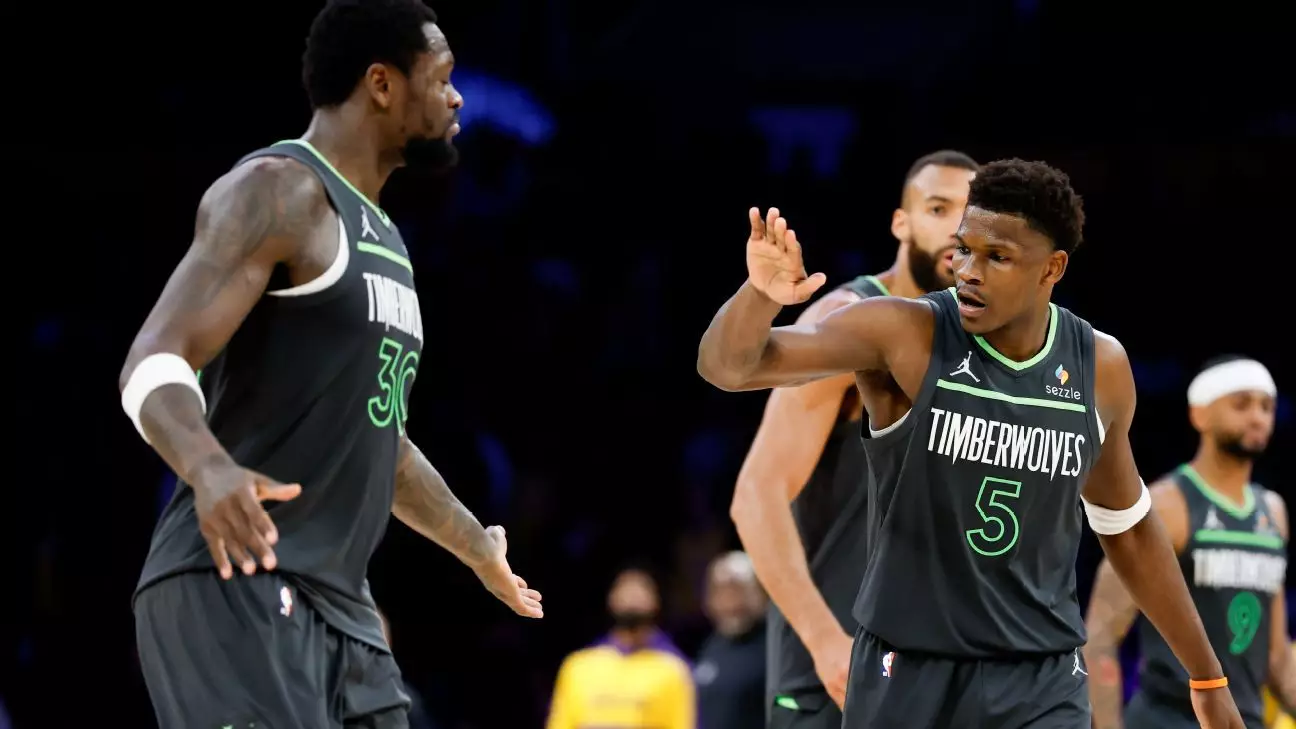In what can only be described as a gritty display of resilience, the Minnesota Timberwolves shifted the narrative of their playoff journey with a remarkable victory over the Los Angeles Lakers in Game 5. Despite facing the potent combination of LeBron James and Luka Doncic, the Timberwolves showcased their ability to rise to occasions that matter most. This matchup wasn’t just about statistical dominance; instead, it exemplified the heart and tenacity that can often be overlooked in the bright lights of playoff basketball.
Rudy Gobert, often criticized for his offensive limitations, silenced his doubters by delivering a career-high performance in the playoffs, scoring 27 points and pulling down an impressive 24 rebounds. It was a striking turnaround from his previously lackluster series, reminding everyone that player development and adaptability are critical when stakes are high. In a game where 3-point shooting fell flat—7-for-47—the Timberwolves displayed a relentless spirit not reliant on the perimeter but centered in the paint, where Gobert imposed his will against a smaller Lakers lineup.
Defying the Odds
While many expected the Lakers to hammer down their advantage in the series, the Timberwolves exemplified the often underappreciated prowess of conceding the spotlight to the collective strength of a team. Coach Chris Finch emphasized mental toughness in his post-game remarks, stating that it was their resilience—not just their shooting—that propelled them to victory. Minnesota’s ability to remain unfazed by their shooting misfortunes captures the essence of what playoff basketball often demands: unwavering resolve and a willingness to grind out substantial performances despite adversity.
Anthony Edwards also anchored the team with a steady 15 points and 11 rebounds, contributing to the Timberwolves’ balanced attack. Edwards’ growth as a player illustrates the potential for Minnesota to invest in youth while blending them with seasoned professionals like Gobert. This combination of dynamism and stability could mark a turning point for a franchise historically plagued by inconsistency in playoffs, offering a glimpse into a brighter future.
Lakers’ Future in Question
On the flip side, the Lakers’ defeat pushes them into a difficult crossroads. Despite flaunting star power and a roster overhaul mid-season, their inability to advance past the first round raises significant concerns regarding team chemistry and long-term viability. Coach JJ Redick’s mixed feelings of disappointment and gratitude showcase the complexity of their situation, acknowledging that while Minnesota deserved credit, the Lakers need to reassess their strategy moving forward.
Combining seasoned veterans with younger talents like Rui Hachimura, who led the Lakers with 23 points, has proven insufficient against a Timberwolves team that has grown immensely in a short period. The balance between experience and youth is delicate, and as the Lakers struggle to find theirs, the urgency for moves in the offseason will be palpable. They cannot afford to be stagnant if they are to reclaim their status as championship contenders, especially after a second consecutive early exit.
A New Era for Minnesota
For Minnesota, this triumph is not merely a win; it is a signal that they can compete on the grand stage, transitioning from perennial underachievers to formidable contenders. The prospect of facing the winner of the Houston-Golden State series will present another challenge, but the Timberwolves should embrace this energy harvested from their newfound play-off flair.
As they prepare for their next encounter, they should carry the lessons learned during this series. The notion that success in basketball depends solely on external factors—be it trading for big stars or landing high draft picks—has been challenged. Instead, this Timberwolves team is rapidly becoming a case study in cultivating belief, developing already available talent, and maintaining mental composure when it matters most.
The NBA landscape is constantly shifting, and the Timberwolves have thrust themselves into the conversation. They have made a powerful statement: with the right mindset and execution, they are no longer the kids at the back of the class, but rather, players prepared to take on the established giants of the league.


Leave a Reply